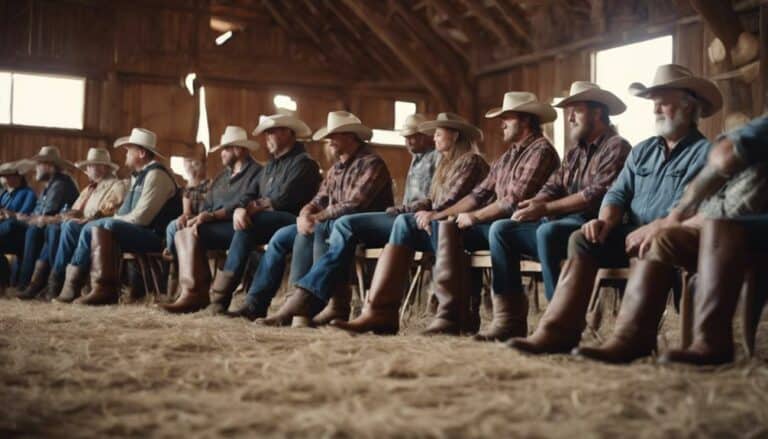Discover how ranchers play a pivotal role in community sustainability efforts by sharing knowledge on sustainable farming. Their focus on conservation tillage, grazing methods, water conservation, and wildlife preservation instills a deep respect for the land. Ranchers lead the charge in environmental stewardship, inspiring a sense of responsibility within communities. By emphasizing sustainable practices, they drive agricultural resilience and land health, contributing to a more sustainable future. Explore how these dedicated individuals are shaping the foundation of community sustainability through their expertise and passion for the environment.
Key Takeaways
- Ranchers actively educate communities on sustainable farming practices.
- Sustainable practices include promoting grazing techniques and crop rotation.
- Environmental stewardship initiatives focus on soil health and water conservation.
- Inspire eco-friendly actions by involving communities in agricultural projects.
- Ranchers contribute to local sustainability through land stewardship practices.
Role of Ranchers in Community Education
Ranchers actively engage in educating their communities about sustainable farming practices, playing an essential role in fostering environmental stewardship and agricultural resilience. Through sustainable agriculture research and hands-on education programs, farmers equip their neighbors with the knowledge and skills needed to promote conservation tillage and sustainable land management. By sharing their expertise in environmental stewardship and leadership skills, ranchers not only enhance the understanding of sustainable practices but also inspire a sense of responsibility towards the land.
Moreover, these education programs offer valuable insights into animal welfare and holistic farming approaches, encouraging community members to adopt more sustainable practices in their own agricultural endeavors. Ranchers serve as mentors, guiding individuals through the intricacies of sustainable agriculture and promoting a culture of innovation and resilience within the farming community. Their dedication to educating others underscores the importance of collaboration and shared learning in building a more sustainable and environmentally conscious society.
Sustainable Practices Advocated by Ranchers
Advocating for sustainable land management practices, ranchers champion methods that enhance ecosystem health and agricultural resilience. By prioritizing sustainable grazing, water conservation, and regenerative agriculture, ranchers play a vital role in promoting environmental stewardship.
Here are four key sustainable practices advocated by ranchers:
- Sustainable Grazing: Ranchers promote sustainable grazing techniques to improve soil health, enhance biodiversity, and support healthier pastures.
- Crop Rotation: Implementing crop rotation strategies helps enhance pasture productivity, reduce erosion, and maintain soil fertility over the long term.
- Water Conservation: Ranchers emphasize the importance of efficient irrigation methods and water management practices to conserve water resources and promote sustainable agriculture.
- Wildlife Habitat Preservation: Educating communities on wildlife habitat preservation fosters ecosystem stewardship and supports the conservation of diverse species within the ranching landscape.
Through these sustainable practices, ranchers not only secure the longevity of their operations but also contribute significantly to community sustainability efforts.
Environmental Stewardship Initiatives
Implementing various environmental stewardship initiatives is crucial for ranchers looking to enhance sustainability on their lands and support biodiversity. Ranchers engage in practices such as rotational grazing to improve soil health and reduce erosion. By planting native vegetation, they create wildlife habitats that support biodiversity. Water conservation strategies, like installing efficient irrigation systems, help ranchers manage natural resources effectively. These sustainable agriculture practices not only benefit the environment but also contribute to reducing greenhouse gas emissions and promoting carbon sequestration.
Ranchers often participate in grant programs like the Research and Education (SARE) program to fund their environmental stewardship efforts. Through these initiatives, they form conservation partnerships with organizations dedicated to preserving natural resources. By working with groups like Resilient Farmers, ranchers can implement land conservation practices that secure the long-term sustainability of their operations. These collaborations help ranchers stay at the forefront of environmental stewardship in agriculture, demonstrating their commitment to sustainable practices.
Inspiring Eco-Friendly Community Actions
Encouraging the adoption of eco-friendly practices within local communities can start with showcasing the tangible benefits of sustainable agriculture through hands-on experiences and educational events. Ranchers engaging in community sustainability efforts serve as role models, inspiring eco-friendly actions in local residents.
To further inspire positive changes in community behaviors, consider the following:
- Program Development: Creating a structured program that educates community members on sustainable agricultural practices can foster long-term environmental stewardship.
- Grant Opportunities: Securing grants to support eco-friendly initiatives can provide resources for implementing sustainable practices within the community.
- Graduate Student Research: Involving graduate students in agricultural research projects can bring fresh perspectives and innovative solutions to local sustainability challenges.
- Agricultural Research in New York: Collaborating with institutions like the Agricultural Research Services in New York can enhance knowledge sharing and promote sustainable food systems.
Contributions to Local Sustainability
Ranchers actively contribute to local sustainability efforts through their dedication to land stewardship practices. Methods like rotational grazing and soil conservation not only improve the health of their land but also positively impact the surrounding environment.
Through research and participation in programs like the Sustainable Agriculture Research and Education (SARE) program, ranchers access competitive grants that support their sustainable initiatives. These grant opportunities enable them to further enhance their stewardship practices and promote sustainable agriculture within their communities.
Conclusion
As ranchers play an important role in educating their communities about sustainability, their impact goes beyond their fields.
For example, a rancher in rural Montana implemented rotational grazing techniques, leading to improved soil health and increased biodiversity on their land.
By sharing their knowledge and practices, ranchers are inspiring others to take action towards a more eco-friendly future, ultimately contributing to the overall sustainability of their local communities.

